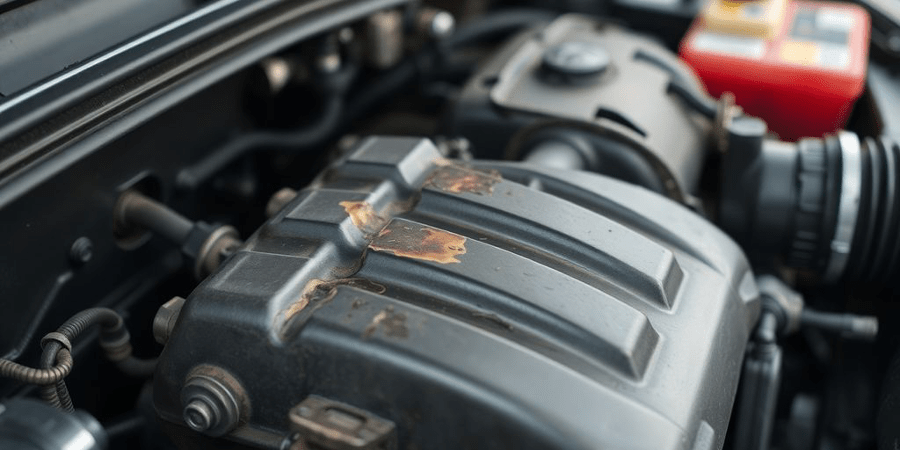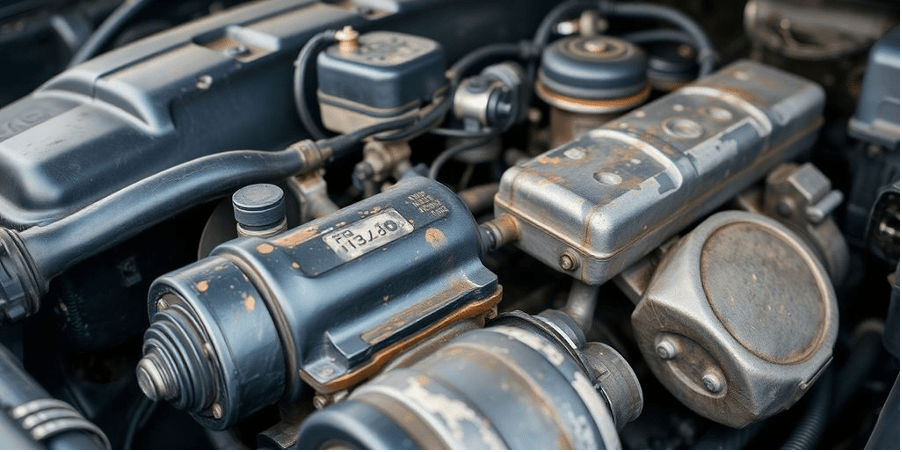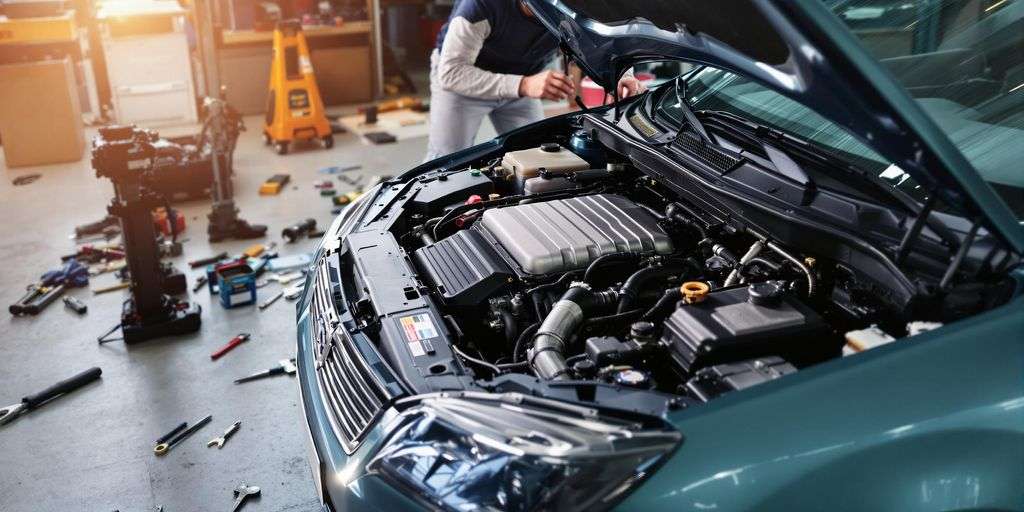Key Takeaways
- Understanding engine knocking helps in assessing car value.
- Professional appraisal can provide a realistic selling price.
- Highlighting other car features can attract buyers.
- Online platforms offer convenience for selling faulty cars.
- Negotiation is crucial to finalize the sale successfully.
Understanding Engine Knocking and Its Impact on Car Value

What Causes Engine Knocking?
Engine knocking, often described as a pinging or rattling noise, can be a real headache for car owners. It's usually caused by uneven fuel burning in the engine's cylinders. This can happen due to a few reasons: using low-octane fuel, carbon deposits on the cylinder walls, or even a faulty spark plug. When the air-fuel mixture in your engine doesn't burn smoothly, it causes these knocking sounds.
How Engine Knocking Affects Car Performance
When your engine starts knocking, it's not just an annoying sound. It can seriously mess with your car's performance. Knocking can lead to reduced power and sluggish acceleration, making your car feel like it's dragging itself along the road. It also affects fuel efficiency, so you might find yourself at the gas station more often than you'd like. Addressing this issue is crucial for maintaining optimal engine function. Engine knocking can significantly impact vehicle performance by affecting combustion timing and efficiency.
Assessing the Severity of Engine Knocking
Not all knocks are created equal. Some might just be a minor inconvenience, while others could signal serious trouble. To figure out how bad it is, listen to the sound. Is it a light tapping or a heavy thudding? The latter could mean more severe issues. You can also check for other symptoms like loss of power or increased exhaust smoke. If you're unsure, it might be wise to get a mechanic to take a look. They can tell you if it's something that needs urgent attention or if it's just a minor blip.
Evaluating Your Car's Worth with Engine Knocking

Factors Influencing Car Value
When your car's engine starts knocking, its value takes a hit. Engine knocking can reduce a car's resale value significantly. But it's not just the engine noise that affects the price. Other factors like the car's age, mileage, and overall condition also play a role. If the car has high mileage or other mechanical issues, expect the value to drop even further.
Getting a Professional Appraisal
To get a clear idea of what your car is worth, consider getting a professional appraisal. An expert can evaluate the severity of the engine knocking and give you a more accurate value. This step is crucial because it helps you set a realistic price if you decide to sell. Plus, having an appraisal can make negotiating with potential buyers easier.
Comparing Market Prices for Similar Cars
Check out the market prices for similar cars to see where yours stands. Look for cars of the same make, model, and year with similar engine issues. This comparison will give you a ballpark figure of what you might expect to get. Keep in mind that prices can vary widely based on location and demand.
Knowing your car's worth is key to making informed decisions about selling or repairing it. With the right information, you can decide the best course of action for your situation.
For more details on assessing car value, especially in Australia, you might find this car valuation process guide helpful.
Preparing Your Car for Sale Despite Engine Issues
First things first, get your paperwork in order. You'll need the vehicle title, maintenance records, and any repair estimates. Having this info ready makes you look organized and trustworthy. Buyers will appreciate the transparency, and it might just speed up the whole process.
So, the engine's not in great shape. But what about the rest of the car? Focus on what's working well. Maybe the interior is spotless, or the tires are brand new. Make a list of these highlights. It’s like selling a house; you want to point out the good stuff to offset the bad.
Pricing is tricky, especially with engine problems. Do some homework—check out what similar cars are going for, even those with engine issues. It's all about finding that sweet spot. Too high, and you scare off buyers. Too low, and you’re leaving money on the table. Be realistic. It might help to maximize your auto trade-in value with a thorough cleaning and some minor fixes.
Exploring Different Selling Options for Cars with Engine Knocking
Selling to a Private Buyer
Selling your car to a private buyer can be a bit of a process, but it might get you the most money. Private buyers often pay more because they might see the potential in fixing up the car themselves or using it for parts. However, finding someone who is willing to take on a car with engine issues can take time. You'll need to be patient and ready to answer lots of questions about the car's condition. Be upfront about the engine knocking to build trust, and make sure you have all your paperwork in order.
Using Online Platforms
Online platforms are a great way to reach a wider audience quickly. Websites that specialize in buying cars with problems, like engine knocking, can make the process smoother. These platforms often offer instant quotes and free car pickup, making it a hassle-free option. Just input your car details, and you'll get a quote. It's a good idea to compare offers from different sites to ensure you're getting a fair price.
Considering Junkyards or Salvage Yards
If you're looking for a quick sale, junkyards or salvage yards might be the way to go. They typically buy cars for their metal value, which means the payout might not be huge, but it's fast. These places are more interested in the car's weight than its condition, so engine knocking isn't a big deal to them. It's a straightforward transaction, but make sure to check if they handle all the necessary paperwork before you hand over the keys.
Selling a car with engine knocking doesn't have to be stressful. Whether you choose to deal directly with a private buyer, use an online platform, or go through a junkyard, each option has its own perks and pitfalls. Weighing these can help you decide the best path for your situation.
Negotiating and Finalizing the Sale
Effective Negotiation Strategies
Selling a car with engine knocking might seem daunting, but with the right approach, you can still get a fair deal. Start by being upfront about the engine issues. Transparency builds trust with potential buyers and sets the stage for smoother negotiations. Consider these strategies:
- Research Market Prices: Know the going rate for similar cars with engine problems. This helps you set a realistic price and gives you leverage during negotiations.
- Highlight Other Features: Emphasize aspects of the car that are in good condition, like a new stereo system or recent tire replacement.
- Stay Firm on Your Price: If you've done your homework, stand by your asking price. Be open to reasonable offers, but don't undersell your car.
Ensuring a Smooth Transaction
Once you've agreed on a price, it's time to close the deal. Here are a few steps to ensure everything goes smoothly:
- Get the Agreement in Writing: Draft a simple sales contract that includes the agreed price, payment method, and any terms discussed.
- Confirm Payment Method: Decide on a payment method that works for both parties. Cash is straightforward, but bank transfers offer a paper trail.
- Prepare for Handover: Before handing over the keys, make sure all paperwork is in order. This includes the title, bill of sale, and any other necessary documents.
Handling Paperwork and Legalities
Don't overlook the importance of paperwork in finalizing the sale. Proper documentation protects both you and the buyer. Here's what you need to handle:
- Title Transfer: Ensure the car title is transferred to the new owner. This step is crucial to avoid any future liabilities.
- Bill of Sale: Provide a bill of sale that outlines the transaction details, including the car's condition and any agreed repairs.
- Notify the DMV: Inform your local Department of Motor Vehicles about the sale. This step is essential to remove your liability for the vehicle.
Selling a car with engine knocking doesn't have to be a headache. By being prepared and knowing what to expect, you can navigate the process with confidence and ease.
Alternative Solutions to Selling a Car with Engine Knocking
Repairing the Engine Before Selling
Sometimes, fixing the engine might be the best move. Sure, it costs money upfront, but it can make your car way more appealing to buyers. Repairing the engine can significantly boost the car's resale value. Get a detailed quote from a trusted mechanic to know what you’re dealing with. Weigh the repair costs against the potential selling price to see if it’s worth it. If the numbers add up, this could be your winning ticket.
Donating the Car to Charity
Donating your car can be a feel-good option. Many charities accept vehicles, even those with engine problems. They might repair it or sell it for parts. Plus, you could snag a tax deduction, which is a nice bonus. Just make sure the charity is legit and can provide the necessary paperwork for your tax records.
Trading In at a Dealership
Trading in your car at a dealership is a quick way to offload it, even with engine issues. Dealerships often accept trade-ins as part of a purchase deal. You might not get top dollar, but it’s hassle-free. If you’re eyeing a new ride, this could be a convenient option. Remember, the trade-in value will likely go towards your new car, so it’s not cash in hand, but it simplifies the process.
When dealing with a car that has engine knocking, consider all your options carefully. Each choice has its pros and cons, and what works best depends on your personal situation and goals. Whether you fix it, donate it, or trade it in, make sure it aligns with your needs and financial plans.
Conclusion
Selling a car with engine knocking isn't a walk in the park, but it's definitely doable with the right approach. Whether you decide to go with a scrap yard, an online platform, or a private buyer, each option has its own perks and pitfalls. It's all about weighing your priorities—do you want a quick sale, or are you aiming for the best price? Remember to be upfront about the car's condition to avoid any hiccups down the line. At the end of the day, the best method is the one that fits your situation and gets you the outcome you’re looking for. So, take a deep breath, assess your options, and make the move that feels right for you.
Frequently Asked Questions
What is engine knocking and why does it happen?
Engine knocking is a noise that occurs when fuel burns unevenly in the engine's cylinders. It can happen due to using the wrong fuel type, worn-out spark plugs, or carbon build-up inside the engine.
Does engine knocking lower my car's value?
Yes, engine knocking can decrease your car's value because it indicates potential engine problems, which might lead to costly repairs.
Can I sell my car if it has engine knocking?
Absolutely! You can sell a car with engine knocking, but you may need to lower the price to attract buyers who are willing to fix the issue.
What are some options for selling a car with engine knocking?
You can sell it to a private buyer, use online platforms that buy damaged cars, or consider selling it to a junkyard or salvage yard.
Should I fix the engine knocking before selling my car?
It depends on the repair cost and your car's value. If fixing it costs more than the car's worth, it might be better to sell it as-is.
How do I set a fair price for my car with engine knocking?
Research similar cars with engine issues, consider getting a professional appraisal, and set a competitive price based on your findings.



